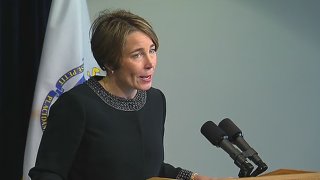
The Massachusetts House is gearing up for a formal session vote Wednesday on a redrafted version of Gov. Maura Healey's fiscal year 2023 supplemental budget that also includes elements of her nearly $1 billion "immediate needs" bond bill.
The House Ways and Means Committee bill has a bottom line of $223 million net ($353 million gross), includes $585 million worth of bonding authorizations, and extends popular pandemic-era policies like outdoor dining and cocktails to-go.
It could be the first significant bill to reach the new governor's desk since she took office in this year. But the bill will not become law by Thursday, when the last round of enhanced federal food assistance benefits are due to go out, because the Senate is not planning to fast-track the supp budget by week's end, an aide to Senate President Karen Spilka said.
Get Boston local news, weather forecasts, lifestyle and entertainment stories to your inbox. Sign up for NBC Boston’s newsletters.
Committee members voted 28-0 with one member reserving his or her rights Tuesday morning on the redrafted version of H 47, which was a $282 million spending bill when Healey filed it a month ago and told lawmakers it was necessary to manage a surge in demand for emergency shelter and to prevent the free school meals program from running out of money.
House Ways and Means Chairman Aaron Michlewitz was not made available Tuesday to discuss his committee's new bill (H 57). It is expected to be a topic of discussion when House Democrats caucus privately Wednesday ahead of the House's formal session.
The draft appears to include all of what was in Healey's bill -- about $86 million toward the emergency shelter system (the House appears to have boosted the total by $1 million), $130 million to keep expanded nutrition assistance that expires Thursday in place for a few more months, and $65 million for the universal school meals program. The House also included in its redraft $68 million in early education and care workforce stabilization grants.
Local
In-depth news coverage of the Greater Boston Area.
Federally enhanced Supplemental Nutrition Assistance Program (SNAP) benefits are scheduled to end Thursday. More than 630,000 Massachusetts households could face a loss of about a third of what they received in food assistance over the past two years without House and Senate action on the bill or some other government intervention before April's benefits are distributed.
According to Project Bread, more than 647,000 Massachusetts households will receive their last increased payment on Thursday and lose, on average, $151.46 per month in additional benefits, based on data from the Department of Transitional Assistance. The emergency allotments were meant to be temporary during the COVID-19 Emergency, but Project Bread says the extra federal funds "have become a lifeline" for households with children facing food insecurity.
House Speaker Ronald Mariano said Monday that the school meals funding "has been a huge request from my membership."
"So there's a lot of good things that we want to do to continue the progress that we're making in areas that I think are needed. So I think it's a pretty good supp budget," he said.
The committee redraft also includes parts of Healey's $987 million "immediate needs" bond bill for housing and economic development programs (H 51), including $400 million for the MassWorks Infrastructure Program, $104 million for the Clean Water Trust to help finance municipalities' efforts to improve local water quality, $34 million for the Underutilized Properties program, which is used for redevelopment of abandoned or underutilized properties, $15 million for the Massachusetts Manufacturing Innovation Initiative, $14 million for the Massachusetts Manufacturing Accelerate Program, and $1 million for Community Planning Grants.
But the House did not go along with Healey's requested bond authorizations for a $200 million state match for federal grant programs included in laws such as the CHIPS and Science Act, $48 million for the repair and modernization of public housing, $30 million to compete for community broadband dollars through the bipartisan infrastructure law, $25 million in funding for library project grants, and $10 million for a coastal community grant program.
Healey said last month that her administration also plans to file a more comprehensive bond bill later in the session. That bill could revive some of the proposals that the House decided to forgo.
The House is also looking to use the combo supp budget/bonding bill as a vehicle to extend some policies that originated in the COVID-19 pandemic that started three years ago.
The committee redraft includes language extending both the state's permission for restaurants to sell beer, wine and cocktails for take-out and authorization for expanded outdoor dining from April 1, 2023 to April 1, 2024.
It also would extend the authority for public bodies, agencies and commissions to hold their meetings remotely until March 31, 2025 -- two years from the current expiration date of March 31, 2023. The bill also extends remote town meetings and the ability of towns to adjust town meeting quorums to the same date. Public bodies are required to provide "adequate, alternative means" of public access to their meetings and for members of those groups to participate in deliberations remotely.
Since the start of the pandemic, basically every public body in Massachusetts -- the Legislature, legislative committees, executive branch departments and agencies, local boards and more -- have offered some form of remote access, which advocates say has improved access for people with disabilities and people who may not be able to travel to attend a meeting in person. Local officials called on the state to extend remote and hybrid meeting options beyond March 31 at a Local Government Advisory Commission meeting in mid-February.
"I really believe that the future in governing and in corporate life is to continue to use this new technology to benefit ourselves and our communities," Pittsfield Mayor Linda Tyer said at the LGAC meeting. "One of the benefits of that is greater community engagement. People who might not be able to join in person are able to Zoom in, make their public comment and then go back to whatever they're doing."
The Senate voted this session to permanently allow remote voting in its own sessions, continuing what had been an pandemic-era rule in the chamber. While the House will require members to be in person to vote, the House and Senate adopted a hybrid committee hearing structure that will allow for both in-person and remote participation for most legislators and the public.
The House is also proposing in the bill to make permanent the authorizations for remote notarization services, remote reverse mortgage counseling, and remote shareholder meeting and board of directors meetings for non-profits, a Ways and Means Committee spokesman said.
The bill that the House is preparing to put on the floor Wednesday addresses much of what was in the two of the first three bills that Healey filed as governor, and the third is also on the move in the Legislature. Her bill (H 52) to authorize the state to borrow an additional $400 million to fund road and bridge work under the Chapter 90 program for the next two years is scheduled for a hearing before the Joint Committee on Transportation on March 7.



